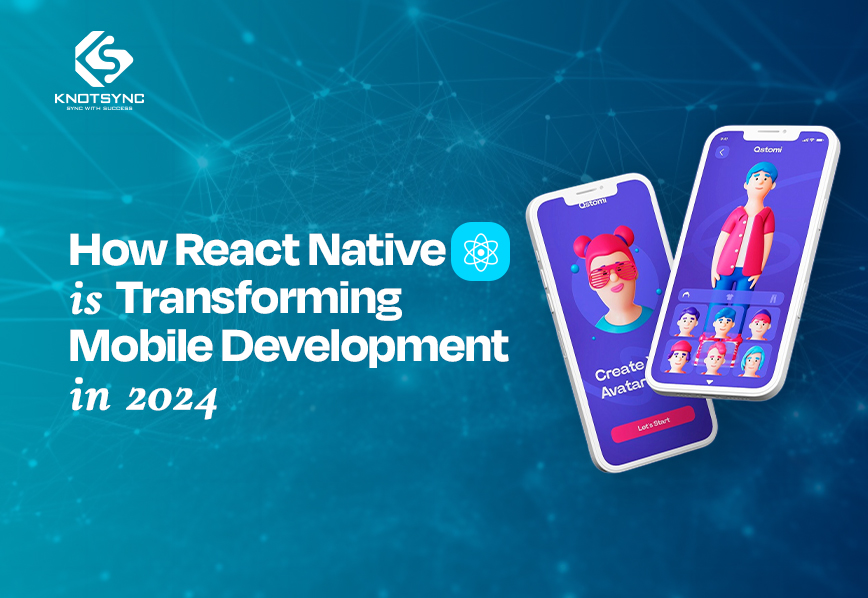In the fast-growing world of mobile app development, it is very important to keep pace with technology. Moving into the future, React Native app development has indeed become a game-changing force that is changing the whole approach toward the creation and handling of mobile applications. Wondering why? Let’s take a look into its impact and why it is changing the whole landscape of developing a mobile application. React Native transforming mobile development by enabling a single codebase for both iOS and Android, cutting development time and costs while delivering near-native app performance.
What is React Native?
So, the first question is, “What is React Native?” Simply put, React Native is a framework developed by Facebook. It allows developers to create mobile applications from JavaScript and React for iOS and android. Further, by developing app using React Native, developers can eliminate programming code twice for iOS and Android separately.
React Native mobile development respects JavaScript for what it is, but at the same time, it employs the component-based architecture that React uses for active and dynamic UI development. In other words, react native app development takes the best of two worlds and bridges JavaScript with native code for a hybrid solution that performs almost as well as fully native applications.
Do you know that Facebook was the first website programming turned application? Instead of programming applications separately for iOS and android, Facebook used React Native and transformed their JavaScript of Facebook into an application.
What is the Need of React Native?
Before React Native, a developer needed to create applications separately for iOS and Android. It became very time-consuming as this further included the hassle of maintaining two different codebases. This led to an increasing demand for much more straightforward and smooth development of applications.
The problems diminished with React Native mobile development since the developers have a write-once-deploy-on-both features. This speeds up development and saves money, thus providing an option for enterprises with resource optimization. It provides consistent user experience-a feature that makes React Native app development common nowadays in the tech world.
In short, React Native for Mobile App Development is revolutionizing how businesses approach creating mobile solutions.
What are the Benefits of React Native?
There are many benefits when it comes to mobile app development using React Native. Let’s go through some of the important ones briefly.
1. Single Codebase: The single codebase for Android and iOS development, based on a cross-functional language, will cut down not only on development time but also on future maintenance updates.
2. Faster Development: With features like hot reload allows developers to view the changes in real time and skip rebuilding of the entire application. Thus, speeding up the whole development process.
3. Community Support: Community support from the React Native community is abundant, always growing, and continuous. This means that lots of resources, libraries, and tools are at the disposal of developers to help ease development and common challenges.
4. Cost Efficient: React Native reduces the need for separate codebases, hence reducing the development and maintenance cost. It is cost-effective and good for a company that must make the most of everything.
What are the Drawbacks of React Native?
Though React Native has many advantages, it also has its own demerits that stop React Native from being a totally flawless framework. Some of them are as follows.
1. Performance Issues: While React Native has improved a lot in terms of performance, it may still be lagging compared to fully native apps in CPU-intensive scenarios or with complicated animations.
2. Dependency on Libraries: Most of the projects in React Native are dependent on third party libraries to extend their capabilities. This imposes a dependency that might be potentially troublesome during update and maintenance.
3. Limited Support of Native Modules: Although React Native has a huge set of native modules, for some features or functionality, one would still have to write native code, as there is limited support for them.
4. Debugging Complexity: Debugging becomes complex when it includes native modules. In most cases, the developers are prone to find a problem that requires deep knowledge of both JavaScript and native sides. Given the challenges with it, React Native application development is still quite feasible and potent.
How React Native Transforming Mobile App Development in 2024?
As we swim deeper into 2024, mobile development using React Native has become more relevant for developers. Here are some keyways in which React Native is defining mobile app development.
1.Successful Use Cases: React Native has successfully been used in building high-profile apps such as Facebook, Instagram, Airbnb, and many more. These all serve as good examples to prove its capabilities when it comes to handling complex and high-traffic apps effectively.
2. Industry Trends: React Native has contributed to a surge in hybrid applications, which used AR and VR to the industry. They are quite flexible; hence, most people will enjoy using them to experiment with their new innovations.
3. Developer Experience: The tools and workflows of React Native get much better with every single day. Improved debugging utilities, better documentation, and smoother workflows make developers more productive and enjoy the work.
4. Innovation of User Experience: React Native thus permits developers to create rich and interactive user experiences that can be put on a par with native ones. The capability of this framework to provide a smooth and responsive interface stands as testimony to its effectiveness.
These metrics explain how formation of mobile development has transformed, with the help of react native mobile development, new standards are being set up for future applications.
FAQs
Now, you are aware about React Native and how it is transforming mobile application development in 2024. However, there might be some questions that might cross your mind that still remain unanswered. So, let us take a look and get a better understanding about React Native.
What types of apps are best suited for React Native?
React Native is versatile and can be used for various types of apps, from simple ones to more complex, feature-rich applications. It’s particularly effective for projects that require cross-platform functionality.
How does React Native compare to other cross-platform frameworks?
Compared to other frameworks, React Native offers a robust balance between performance and ease of development. It benefits from a strong community and a rich ecosystem of libraries and tools.
What are the key skills needed for a React Native developer?
A developer working with React Native should be skilled in JavaScript and React, with a good understanding of mobile development principles and native mobile environments.
How often is React Native updated?
React Native is frequently updated with new features, improvements, and bug fixes. Staying updated with the latest releases is crucial for making the most of the framework’s capabilities.
Can React Native be used for developing complex or high-performance apps?
Yes, React Native can handle complex and high-performance apps, though specific requirements might necessitate additional native code or optimizations.




